History
The story about Geismars
1866
CHRISTIAN FREDERIK GEISMAR
In 1866, 26-year-old C. F. Geismar arrived in Copenhagen from his hometown of Nyborg on the island of Funen, driven by a simple vision: to produce and sell fine, lightweight textiles of the highest quality to the Danish people.
C. F. Geismar had an exceptionally refined sense of quality and recognized a gap in the textile market in the capital. He established Geismars Væverier and opened his first textile store at Hovedvagtsgade No. 6. Due to high demand, he soon began his own production, setting up a hand-weaving workshop on Amager.
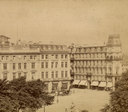

Industrial history
This would prove to be the beginning of a remarkable chapter in Danish industrial history — founded on C. F. Geismar’s vision of superior quality and excellent service.
C. F. Geismar was driven by a creative spirit shaped in the aftermath of Denmark’s defeat to Germany in 1864. It was a spirit rooted in a broader national desire for renewal — a deep-seated belief that when you set out to do something, it should, must, and could succeed.
1880-1900
EXPANSION
The popularity of Geismars Væverier’s quality products grew steadily — laying the foundation for expansion. This initially led to the transition from hand weaving to machine weaving in 1882, with new facilities on Peter Bangsvej 26 in Frederiksberg.
In 1898, the factory burned down, but by 1899 Geismars Væverier had built a new, larger factory at the same address.
In 1888, the now 49-year-old manufacturer C. F. Geismar was awarded the first medal at the major Nordic Industrial Exhibition in Copenhagen. That same year, Geismars Væverier applied for a building permit to expand the mechanical weaving facility on Peter Bangsvej with a “steam-powered linen weaving mill.”
As the company continued to grow, C. F. Geismar also established a small bed factory and a mattress production facility. In this way, Geismars Væverier became able to supply nearly everything for the bedroom: bed linen, beds, and mattresses.
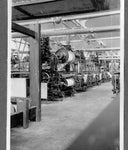

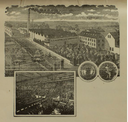

1916
GEISMAR FOUNDS DENMARK’S TEXTILE VOCATIONAL SCHOOL
At times, finding qualified labor proved challenging, and the company often had to take responsibility for training and educating new employees to ensure the highest quality. With this challenge in mind, C. F. Geismar decided in 1916 to collaborate with the Danish Textile Workers’ Union and the Textile Manufacturers’ Association to establish Denmark’s Textile Vocational School.
Classes were held in the evenings, allowing participants to work alongside their studies. The school was led by C. F. Geismar’s own son, Axel Geismar, who later authored Bindingslære in 1920 — a foundational textbook on weaving and textiles that remained a key educational resource for many years.
1924
STORE ON AMAGERTORV
In 1924, the shop on Hovedvagtsgade closed, and Geismars Væverier instead opened in the very same premises at Amagertorv 13, where Mads Nørgaard is located today. At the same time, Geismars Væverier discontinued sales through intermediaries and began selling exclusively directly from their own production.
This approach allowed the company to keep prices low despite maintaining its high level of quality. Customers flocked to the new store, which offered direct-from-factory sales, and revenue increased significantly. The store remained at that location for 20 years, eventually closing in 1944.
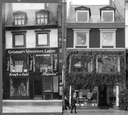

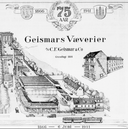

1941
75TH ANNIVERSARY
At its 75th anniversary in 1941, the company employed around 300 people. The family-owned business, led at the time by Managing Director August Valdbjørn, chose to reward all salaried employees with an extra month’s pay and hourly workers with an additional week’s wages.
Shortly after the anniversary, parts of the weaving production in Denmark were halted due to wartime shortages. Instead, most fabrics were imported from high-quality weaving mills in Europe, while final products continued to be sewn in Danish workshops.
The laundry and rental service flourished, and with major long-term clients such as Tivoli, Nimb, Hotel d’Angleterre, and Amalienborg, the company continued to grow. Geismars delivery vans became a familiar sight on the streets of Copenhagen.
1960-1980
LAUNDRY AND WEAVING OPERATIONS SEPARATED
Per Lynggaard took over as Managing Director in 1960, following the death of August Valdbjørn in 1956. His primary task became the development of the linen rental and laundry services.
However, during the 1960s, Geismars Dampvaskeri (steam laundry) faced increasing challenges as more households acquired washing machines or began using self-service laundromats.
By 1979, it was no longer viable for Geismars Væverier to produce high-quality textiles in-house. The broader textile industry in Denmark was being outcompeted by European manufacturers with more advanced and modern technologies.
Disagreements with the Valdbjørn family ultimately led to Lynggaard stepping down that same year, and Lise Skou was appointed as the new Managing Director.
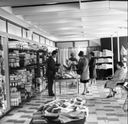



1985
MRS. SKOU TAKES OVER
As Managing Director, Lise Skou successfully continued to run Geismars Væverier and Geismars Dampvaskeri, achieving such remarkable results that it did not go unnoticed. In 1983, ISS chose to acquire the entire company from the Valdbjørn family as a result.
However, in 1985, the laundry and sewing workshops on Peter Bangs Vej were destroyed by fire, giving Lise Skou the opportunity to buy Geismars Væverier back. She took over the company with its strong reputation, loyal customers, and excellent name, and successfully continued to grow Geismars Væverier in a new store on Vesterbro.
2003
NEW TIMES AT STORE STRANDSTRÆDE
One day in 2003, Ulrik Rafaelsen passed by Geismars Væverier on Vesterbrogade and noticed that there was a clearance sale. Believing that the company with its long history still had much to offer, he and his wife decided to take over Geismars Væverier from Mrs. Skou. They opened a new flagship store in the premises of the old post office at Store Strandstræde 21.


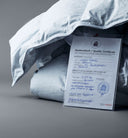

2016 - NOW
GEISMARS TODAY
In 2016, it was 150 years since C. F. Geismar established Geismars Væverier. The anniversary was celebrated with the publication of a commemorative book that tells the story of the company from its inception, alongside significant events in Denmark’s history.
Today, most of the fabrics are produced at the best weaving mills in Italy, based on Geismars' own specifications—featuring both timeless and newly developed designs. A sewing workshop in Portugal handles the majority of the production of finished products. The current range includes not only bed linen and a few classic tablecloths and napkins, but also duvets, pillows, nightwear, a towel series, and plaids.

